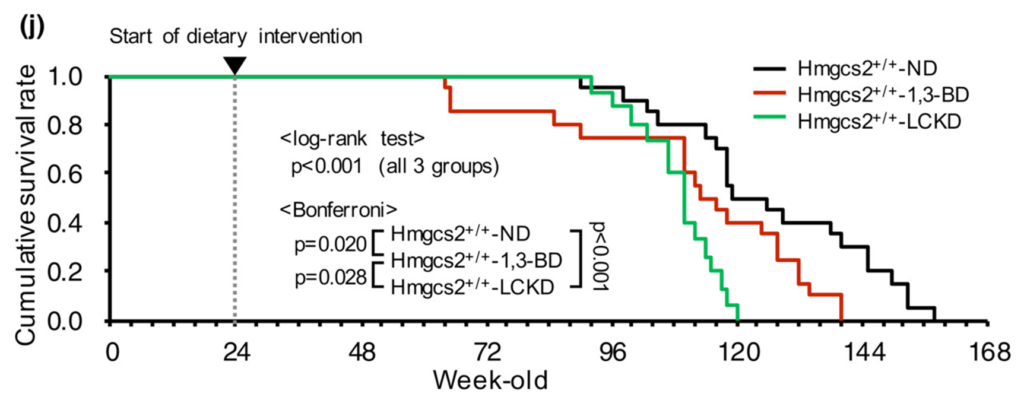Researchers Find Low-Carb Ketogenic Diet Can Reduce Lifespan in Mice
Japanese researchers from Shiga University of Medical Science show that, while ketogenesis is essential for mouse survival, a low-carb ketogenic diet shortens lifespan in middle-aged and old mice.
Highlights:
- Genetically altered mice lacking ketogenesis have shortened lifespans.
- Middle-aged and old mice fed a low-carb ketogenic diet exhibit higher mortality.
- Supplementing the regular diets of old mice with a solvent for flavoring agents (1,3-butanediol) improves survival.
Interest in the keto diet has skyrocketed in recent years, with consumer products bearing the label taking over grocery shelves. But does the keto diet actually provide health and longevity benefits?
New research from Shiga University of Medical Science in Japan shows that eating a keto-based diet doesn’t support a longer lifespan—in fact, it may even shorten it. Mice fed low-carb ketogenic diets either beginning in middle age or older age both saw decreased lifespans, according to research published in Aging Cell. Interestingly, middle-aged mice supplemented with ketone bodies (the product of ketogenesis) but that did not eat ketogenic diets had shortened lifespans, while older mice on this diet saw an increased lifespan.
“Ketone body supplementation may represent a double-edged sword with respect to survival, depending on the method of administration and health status,” wrote the study’s authors.
Ketogenesis: Fad or Fiction?
By restricting carbohydrate intake, the ketogenic diet makes your body adapt to burning fat for energy (ketosis). The ketogenic diet is characterized by its reliance on ketone bodies, a type of fuel that the liver produces from stored fat rather than the sugar (glucose) that comes from carbohydrates (such as grains, legumes, vegetables, and fruits).
Losing weight by destroying excess fat seems like the perfect solution. However, inducing ketone body production in the liver can be challenging. Carbohydrate restriction means eating less than 20–50 grams of carbs daily (a medium banana has about 27 grams of carbs, for reference), and too much protein can prevent the body from entering ketosis.
The Effect of Ketone Bodies and Ketogenesis on Lifespan Is Age-Dependent
The precise role of ketone bodies in mammalian longevity has been hotly contested for quite some time, as calorie restriction and low-carb ketogenic diets cause many metabolic changes in addition to ketogenesis. In the present study, the Japanese research team shows that ketogenesis is essential for maintaining a normal lifespan. Mice that were genetically altered to delete an enzyme critical for ketogenesis had shortened lifespans. Supplementing with 1,3-butanediol—a precursor to one of the three key ketone bodies produced by ketogenesis (β-hydroxybutyrate)—rescues mice from a shortened lifespan.
So while ketogenesis is an essential function for maintaining lifespan, is ketogenesis lifespan extending? And, if it is (or isn’t), at what age does it have the greatest effect?
To answer this question, Tomita and colleagues first took middle-aged mice (24 weeks) and put them on one of three diets: a normal diet, a ketone-supplemented diet (by adding 1,3-butanediol), or a low-carb ketogenic diet. Both of the mice that were put on diets intended to mimic ketogenesis or activate ketogenesis didn’t have increases in lifespan. Middle-aged mice put on normal diets supplemented with 1,3-butanediol had shortened lifespans compared to those on normal diets. When put on a low-carb ketogenic diet, which contained 4.5% carbohydrate, 80.8% fat, and 14.7% protein (calorie %), these mice had even shorter lifespans.

reduced lifespan over 20%.
Next, the Shiga University of Medical Science research team first took old mice (72 weeks) and put them on one of the three diets. Just like in middle-aged mice, low-carb ketogenic diets shortened the lifespan in older mice compared to those on normal diets. But, unlike in middle-aged mice, old mice put on a ketone-supplemented diet (by adding 1,3-butanediol) had increased lifespans compared to those on normal diets.

Finally, the Japanese researchers looked at how these diets influenced young mice that were genetically altered to have an aging disease. The three diets had similar effects on young mice with the aging condition of atherosclerosis-related organ damage. These mice on unsupplemented diets had shorter lifespans than non-genetically altered mice. These atherosclerotic mice had even shorter lifespans when put on low-carb ketogenic diets. But when the diets of these mice were supplemented with ketone bodies, their lifespan recovered to the same length as that of normal mice on normal diets.
Timing Is Everything
The present results suggest that the timing and method of ketone body supplementation and health status have significant influences on the effects of ketone bodies on mammalian life span. Notably, ketone body supplementation with 1,3-butanediol in early life was associated with higher mortality. Therefore, more research is needed to determine the efficacy and safety of ketone bodies in this regard, especially in younger people.
There is still some disagreement about whether or not low-carb ketogenic diets are healthy. While two 2017 studies published in Cell Metabolism, one by Newman and another by Roberts, demonstrated that time-restricted or energy-controlled low-carb ketogenic diet feeding was reported to extend life span in mice, this study showed that uncontrolled (ad libitum) low-carb ketogenic diets feeding leading to much calorie intake shortened their life span in our study. Therefore, the health benefits of ketone bodies appear to be nullified and even harmful on unrestricted low-carb ketogenic diets. Since low-carb ketogenic diets are frequently used for weight loss, it’s important to keep an eye on how they affect people over the long term.
Model: Mouse
Dosage: daily ketone body supplementation using a diet containing 1,3-butanediol, a precursor of β-hydroxybutyrate

